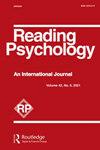Differences in Detecting Statistical Visual Regularities between Typical and Poor Readers
IF 1
Q4 PSYCHOLOGY, EDUCATIONAL
引用次数: 0
Abstract
Abstract The capacities of detecting visual regularities were tested among twenty typical (age 11.1 ±.32), and twenty poor (age 11.03 ±.28) native-Arab readers. Two stages were implemented, passive exposure to visual regularities and forced decision task. In the first stage, the participants were passively presented with four shapes; each shape was displayed with unique invariant features, which present the regularities of the shape in addition to variant features. In the second stage, the participants were presented with forced decision task and were asked to make an acceptance or rejection of presented 160 shapes according to their own preferences regarding the shapes familiarity. Eighty of the presented shapes were compatible with the visual regularities as was presented in the passive learning stage where the other shapes presented the non-compatible condition. The results indicated that typical readers showed significantly higher levels of true responses in the decision task. In addition, among the typical readers group shorter response times were significantly recorded for the compatible items compared to non-compatible items. Such differences in response times were not observed among the poor readers. The results support the assumption that poor orthographic learning among poor readers could be associated with inefficient statistical learning capacities.典型读者与不良读者在统计视觉规律检测上的差异
摘要在20名典型(年龄11.1±.32)和20名贫困(年龄11.03±.28)的阿拉伯本地读者中测试了检测视觉规律的能力。实施了两个阶段,被动暴露于视觉规律和强制决策任务。在第一阶段,参与者被动地呈现出四种形状;每一个形状都表现出独特的不变特征,这些特征除了表现出变异特征外,还表现出形状的规律性。在第二阶段,参与者被要求执行强制决策任务,并被要求根据他们自己对形状熟悉度的偏好来接受或拒绝所呈现的160个形状。80个呈现的形状与被动学习阶段呈现的视觉规律相兼容,其他形状呈现不兼容条件。结果表明,典型读者在决策任务中表现出显著更高水平的真实反应。此外,在典型的读者群体中,与不兼容项目相比,兼容项目的响应时间显著缩短。在贫困读者中没有观察到这种反应时间的差异。研究结果支持了这样一种假设,即贫困读者的正字法学习能力较差可能与统计学习能力低下有关。
本文章由计算机程序翻译,如有差异,请以英文原文为准。
求助全文
约1分钟内获得全文
求助全文
来源期刊

Reading Psychology
PSYCHOLOGY, EDUCATIONAL-
CiteScore
2.20
自引率
7.10%
发文量
28
期刊介绍:
Prepared exclusively by professionals, this refereed journal publishes original manuscripts in the fields of literacy, reading, and related psychology disciplines. Articles appear in the form of completed research; practitioner-based "experiential" methods or philosophical statements; teacher and counselor preparation services for guiding all levels of reading skill development, attitudes, and interests; programs or materials; and literary or humorous contributions.
 求助内容:
求助内容: 应助结果提醒方式:
应助结果提醒方式:


